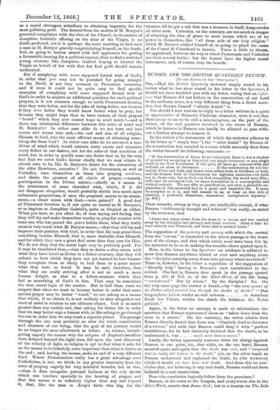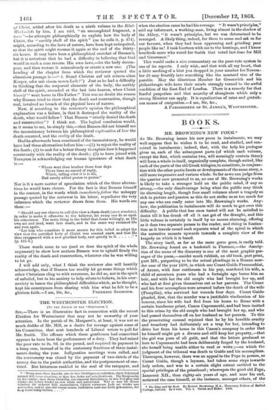BUNSEN AND TILE BRITISH QUARTERLY REVIEW.
(TO THE EDITOR OF THE " EPECTAMOti.1
Sea,—Had the British Quarterly reviewer simply stated in his review what he has since stated in his letter to the Spectator, I should not have troubled you with my letter, seeing that an infer- ence that Bunsen did not believe in the resurrection of our Lord in the ordinary sense, is a very different thing from a direct asser- tion that Bunsen himself "utterly denied" it.
Nor should I now venture to reply to a letter written in a spirit so appreciative of Bunsen's Christian character, were it not that there seems to me to be still a misconception, on the part of the writer, of the real question involved in the views of Bunsen, which in fairness to Bunsen can hardly be allowed to pass with- out a further attempt to remove it.
In the review (the statements of which the reviewer adheres to in his letter as " simply true ") the " utter denial" by Bunsen of the resurrection was asserted in a sense which naturally drew from the writer himself the following comments :— "If the resurrection of Jesus be not historical, there is not a shadow of ground for accepting as historical any single statement or any single word in the New Testament. If this goes, all must go, unreservedly and without an atom of abatement If the resurrection be not his- torical, Peter and John and James were either fools or falsifiers, or both, and the deepest faith of Christendom for eighteen centuries—its faith not in Jesus only, but in God—in God reconciling the world unto Him- self—has its corrupted root, its sham foundation in a contemptible and wicked untruth. We can offer no justification, not even a plausible ex- planation of this mournful fact in a great and beautiful life. It must be accepted as it is, and will remain to us, at least on this side of eternity, a profound, disastrous, anomalous, unexplained mystery." [p. 494.]
These remarks, strong as they are, are intelligible enough, if what Bunsen "deliberately thought and believed " was really, as stated by the reviewer, that
"Jesus was taken down from the cross in a swoon, and was carried away by the disciples into privacy and there revived. After a time he went secretly into Phoenicia, and there died a natural death."
The suggestion of the privacy and secrecy with which the revival from the "swoon " is connected in the above passage is the worst part of the charge, and that which surely must have been felt by the reviewer to be so in making the remarks above quoted upon it.
Now, in the letter to the Spectator no evidence is adduced to show that Bunsen anywhere hinted or ever said anything about the " disciples carrying away Jesus into privacy where he revived." There is, however, in the letter a repetition of the suggestion of " friendly help " having in Bunsen's view contributed to the revival. The fact is, Bunsen does speak in the passage quoted from p. 425 of Vol. ix. of the Bibel-Werk, of the life being "reawakened." But by whom ? By the disciples ? No. On the very same page the answer is found,—by " the same power of the Father which carried him through the shades of death:" " Dm
hingeopferte Leben wieder an 'rich nehmen iu derselben Kraft des Vaters, welche ihn darch die Schatten des Todes gef iihrt."
Again, in the letter no attempt is made to substantiate the assertion that Bunsen represented Jesus as " taken down from the cross in a swoon." On the contrary, the writer admits that Bunsen directly denied that Jesus was " illusively dead in the sense of a swoon," and adds that Bunsen could deny it with " perfect truthfulness, for he had distinctly declared that the death, as he understood it, was . . . . much more than a swoon."
Lastly, the writer apparently narrows down his charge against Bunsen to one point, viz., that while, ou the one hand, Bunsen asserted again and again that the death was real, and " imagined that he really did believe in the death," yet, on the other hand, as Bunsen understood and explained the death, he (the reviewer) thinks it would not have been real death. And from this he con- cludes that, not believing in any real death, Bunsen could not have believed in a real resurrection.
Does this conclusion logically follow from the premisses ? Bunsen, in his notes to the Gospels, and everywhere else in the Bibel-Werk, asserts that Jesus died; but iu a treatise on The Life of Christ, added after his death as a ninth volume to the Bibel- Werk—left by him, I am told, "an uncompleted fragment, a
torso "—he attempts philosophically to explain how the body of Christ, the " earthly shell of the spirit " (as he calls it, p. 474), might, according to the laws of nature, have been kept unimpaired, so that the spirit might resume it again at the end of the thirty- six hours. It may have been a philosophical crotchet of Bunsen's, but it is notorious that he had a difficulty in believing that God would in such a case reverse His own laws,—let the body decom- pose, and then restore it miraculously or create a new one. (The heading of the chapter from which the reviewer quoted the obnoxious passage is:!' 4. Stand Christus auf mil seinem alten Kiirper, oder mit eiuem neuen Leib ?") Just so he had a difficulty in thinking that the corporeal elements of the body, the earthly shell of the spirit, ascended at the last into heaven, when Christ himself " went home to His Father." This was no doubt the reason why Bunsen tried to show that the death and resurrection, though real, involved no breach of the physical laws of nature.
Now, if according to the reviewer's opinion the philosophical explanation was a failure, in that it destroyed the reality of the death, what would follow ? That Bunsen " utterly denied the death and resurrection" ? I think not. The logical conclusion would, as it seems to me, be simply this,—that Bunsen did not himself see the inconsistency between his philosophical explanation of how the death occurred, and the reality of the death.
Had he afterwards been convinced of the inconsistency, he would have had three alternatives before him :—(1) to reject the reality of the death; (2) to seek for a better theory to explain how it happened consistently with the reality of the death ; (3) to have joined with Tennyson in acknowledging our human ignorance of what death
"Where wart thou brother those four days There lives no record of reply, Which, telling what it is to die, Had surely added praise to praise."
Nor is it a mere matter of speculation which of the three alterna- tives he would have chosen. For the fact is that Bunsen himself in the context, in the words which immediately follow the unhappy passage quoted by the reviewer in his letter, repudiates the very inference which the reviewer draws from them. His words are these :-
" Should any one choose to call this view a sham-death (mors simulata), in order to make it offensive to the believer, let every one do so upon his conscience. The main thing is the belief that Jesus willingly, as His own act and deed, went into death, and in the same way resumed life and rose again.
"Let him who considers it more secure for this belief to adopt the view that the putrified body of Christ was created anew, and that He thus reappeared with a new glorified body, rest quietly in it (p. 425-6.)
These words seem to me (and so does the spirit of the whole argument) to show how anxious Bunsen was to uphold firmly the reality of the death and resurrection, whatever else he was willing to let go.
I will add only, what I think the reviewer also will heartily acknowledge, that if Bunsen too readily let go some things which other Christians cling to with reverence, he did so, not in the spirit of unbelief, but in his anxiety to help others to believe, in his over- anxiety to lessen the philosophical difficulties which, as he thought, kept his countrymen from sharing with him what he felt to be a



































 Previous page
Previous page